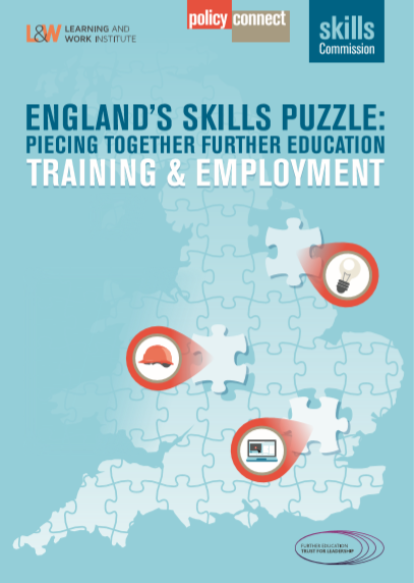ENGLAND’S SKILLS PUZZLE:PIECING TOGETHER FURTHER EDUCATION,TRAINING AND EMPLOYMENT

“Too many people simply do not know about their prospects; good career advice should not be determined by a person’s background. We need to do better so that everyone can receive quality face-to-face, independent careers guidance, whatever their age and wherever they live.” (p.5) Rt Hon. Sir John Hayes CBE MP and Barry Sheerman MP
In this latest evidence-based formal National Inquiry report, 51 references are made to the importance of careers information, advice and guidance. It states the impact of poor careers information, advice and guidance (IAG) was repeatedly emphasised to the Commission over the course of this Inquiry.
Page 11 states: “Delivering a world-class system of careers information, advice and guidance will require LOCAL LEADERSHIP to bring together disconnected activities around data, advice and guidance.”
Page 16 goes on to say: “At the local level a designated body should take a lead on coordinating careers information, advice and guidance. This approach will help provide clear asks to local employers and provide a unified and coherent offer to young people, adults and education providers.” This recommendation fully aligns with ‘Championing Careers Derby: Technical Report’ findings.
“Our vision for the future of FE and skills in England is of a cohesive ecosystem that is driven by the immediate and longterm needs of learners and employers, and is both responsive to and taking the lead on delivering the skills of the future.
The system will be genuinely lifelong, catering for individuals of all ages. For young people entering the labour market, it would be driven by a clear and well communicated understanding of the job opportunities in each locality, led by employers who are best motivated to inspire and enthuse their prospective workforces.
It would offer a range of learning opportunities to suit those currently in work looking to upskill, and those looking to retrain or enter new industries and services appropriate to the 2020s. Choice and fair access, to both traditional and increasingly flexible forms of skills training, would be complemented by opportunities to retrain throughout adulthood as we live and work for longer – most likely via short, tailored training driven by business priorities such as to improve productivity through digital skills.
Learners and prospective learners would be empowered through access to AI-based labour market data (derived from analysis of job advertisements and skill requirements) and regional careers advice services to make informed choices.
Page 37 highlights: “The CONSENSUS amongst contributors to the Inquiry was that despite measures such as the introduction of the GATSBY BENCHMARKS to guide providers with their careers IAG, the current system is too fragmented.”
Let me know you thoughts in this email: [email protected] or @deirdretalks
